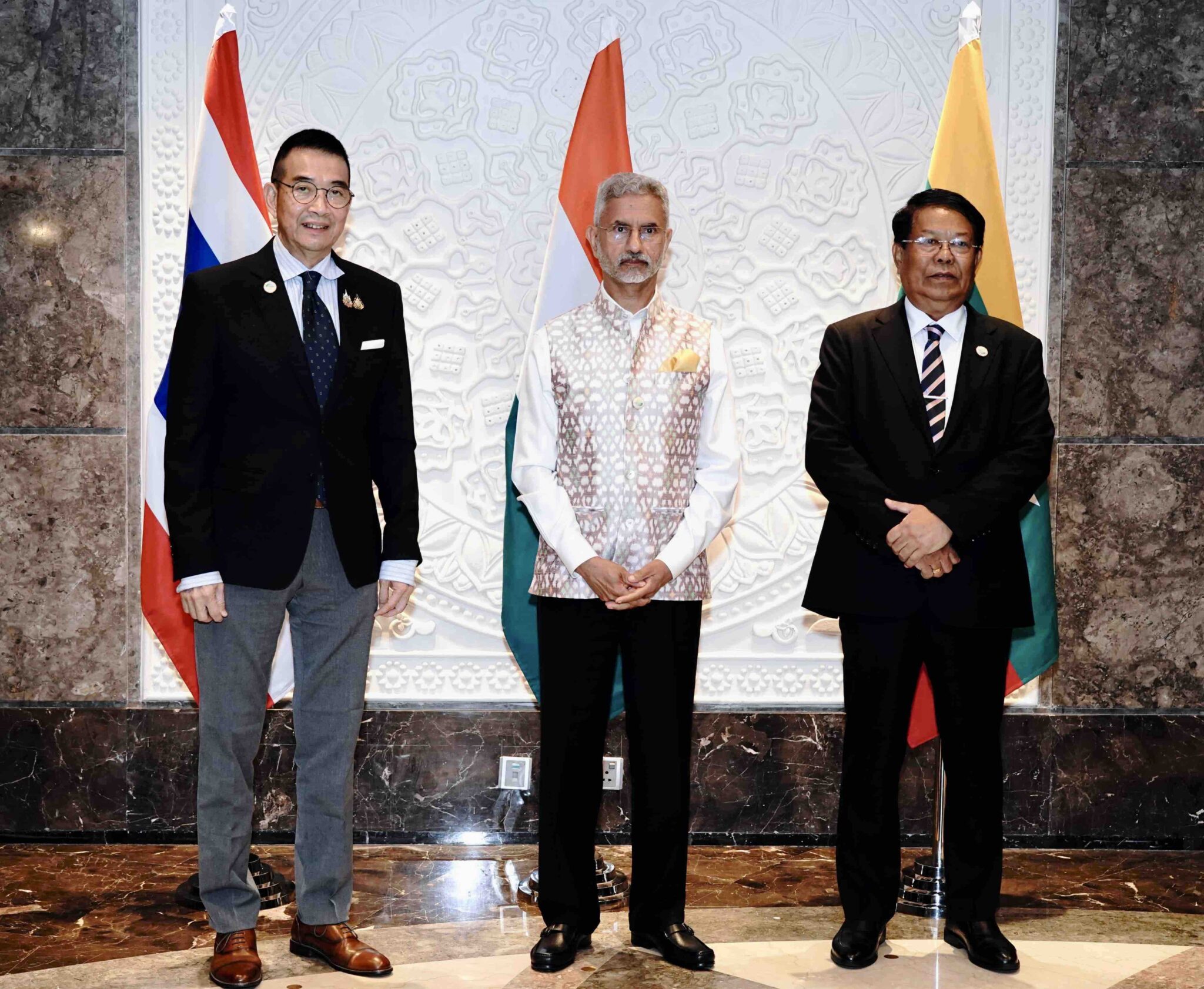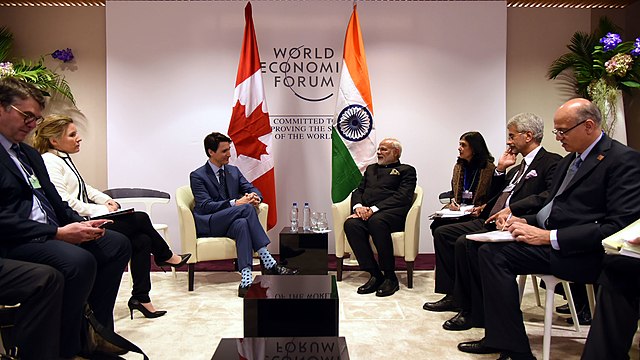By – N.G Ishini Shashipraba

Pic:WikiMediaCommons
“This vision has been a subject of intense debate and controversy, with critics arguing that it goes against the Country’s secular and pluralistic traditions and undermines the rights and freedoms of minority communities“
Hindutva is a political ideology that stresses the role of the supremacy of Hindu culture and religion in shaping Indian society and civilization. The ultimate objective of this ideology is to establish a Hindu Rashtra, a nation-state in which Hindu values and identity play a dominant role in the governance and social fabric of the Country. The proponents of this ideology envision India as a Country where Hinduism serves as the foundational basis for the nation’s culture, politics, and society and where minority groups are expected to adopt and assimilate into the dominant Hindu way of life. This vision has been a subject of intense debate and controversy, with critics arguing that it goes against the Country’s secular and pluralistic traditions and undermines the rights and freedoms of minority communities. The term ‘Hindutva’ means ‘Hinduness’ or the fundamental nature of Hinduism.
The Political Use of Hindutva by the Bharatiya Janata Party and Narendra Modi
Since 1989, the Bharatiya Janata Party, which is one of the leading political parties in India, has been following the ideology of “Hindutva” as its core principle. The BJP has achieved success in elections by relying on an aggressive Hindutva agenda, which has resonated with a significant portion of the Indian population. However, the party’s political opponents fear that the BJP’s continuous reliance on an aggressive Hindutva plank could polarize the Country and create divisions among different religious communities. Despite the criticism, the BJP has continued to promote Hindutva as its core principle. It remains to be seen whether the BJP will continue to rely on this ideology in the future or adopt a more inclusive approach to governance.
Narendra Modi created a historic moment by becoming the first leader to possess a parliamentary majority in the lower house that was not associated with the Congress party, which had been established by Mohandas Gandhi and Jawaharlal Nehru. This was a major transformation in Indian politics as, for the first time in 65 years, a founding party based on hereditary succession was replaced by a new one.
The Economic Aspect
India has garnered global interest for being one of the fastest-growing economies worldwide. In recent times, there have been several inquiries into India’s growth trajectory, with a specific focus on Prime Minister Narendra Modi’s leadership. These investigations also seek to analyze the role of Hindutva, which serves as a guiding philosophical framework for the ruling Bharatiya Janata Party’s (BJP) foreign policy approach. With the BJP’s nationalist ideology shaping its foreign policy since taking power in 2014, the examination of its impact is crucial.
“Hindutva does not provide a clear economic vision, but its pro-big capital and protectionist tendencies often led to adverse effects on the economy.”
But it is also worth to note the complicated interaction between Hindutva and Neoliberal Globalization .While Neoliberalism values financial profit and capital, Hindutva is a Hindu nationalist philosophy that prioritizes cultural and religious identity. However, under Modi’s leadership, the Indian Government has adopted both ideologies, raising concerns about how well they fit together. Hindutva does not provide a clear economic vision, but its pro-big capital and protectionist tendencies often led to adverse effects on the economy. For instance, the cow protection movement has destroyed India’s beef export and leather industries, which were once major sources of income and employment for many people. Furthermore, the glorification of ancient Hindu knowledge and practices tend to undermine the scientific training and innovation, which can have far-reaching consequences for the Country’s development. The communal riots, which are often instigated for political gain, can lead to the displacement of certain communities and the takeover of their assets.
Social Aspect
“Ever since the BJP party ascended to power in India, the Hindutva ideology has made life more difficult for minorities and non-Hindu communities.”
Ever since the BJP party ascended to power in India, the Hindutva ideology has made life more difficult for minorities and non-Hindu communities. The population of India comprises of around 1.3 billion people, out of which approximately 14% are Muslims. Unfortunately, these Muslim individuals have been subjected to violence for decades. The situation has worsened since May 2014, when the Bharatiya Janata Party (BJP) came into power. In May 2019, the BJP was re-elected with a larger majority, which further aggravated the situation. Under the leadership of Prime Minister Narendra Modi, several cities with Islamic names were renamed, and history textbooks were revised to legitimize the ideology of Hindu nationalism. Any text that contradicted this ideology was deleted. This has created a sense of insecurity and fear among the Muslim community in India. As a consequence, during the pandemic, Muslims were accused of spreading the corona virus among Indians on purpose.
There have been several instances where BJP politicians have made statements that are not only unfortunate but also intimidating in nature and are aimed at other communities that practice different religious beliefs. Such statements seemingly pose significant threats to the Country’s social harmony, which can be considered as the backbone of a peaceful and a progressive society. Unfortunately, these statements have not only been made but have also been followed by an alarming increase in crimes against these communities, which has been fueled by the support of the Government. Furthermore, there have been discussions among right-wing politicians to officially change the Country’s name from “India” to “Bharat”, which is a matter of great concern for many citizens who are worried that such a move could lead to further divisions and conflicts within the Country.
“Under the leadership of Prime Minister Modi, India has undergone significant changes in its political and religious landscape, particularly concerning the freedoms of Muslims and Christians. One of the most notable decisions was the revocation of the Kashmir region’s special status in August 2019..”
Under the leadership of Prime Minister Modi, India has undergone significant changes in its political and religious landscape, particularly concerning the freedoms of Muslims and Christians. One of the most notable decisions was the revocation of the Kashmir region’s special status in August 2019, which was seen as a crucial step towards integrating the region into India’s mainstream. The move led to the region’s renaming and reorganization into Jammu Kashmir and Ladakh Union Territories as part of the Indian system. However, the decision was met with opposition of locals, resulting in a strict curfew, communication blackout, and a robust military presence to contain any unrest. The curfew remained in place until February 2021, causing immense hardship for the people of Kashmir, who were already struggling under the Covid-19 pandemic.
Concerns were again raised when Narendra Modi was elected as the Prime Minister of India, given the accusations of his inaction during the Gujarat Riots in 2002, which had resulted in the deaths of over 2000 Muslims. He has been accused by critics of ignoring the violence that took place in the state during his tenure.
These instances have led to a decrease in civil liberties and space for civil society. Additionally, there is a clear and present danger to the Country’s secular democracy due to attempts by Hindu nationalists to remove secularism from both politics and society. However, a resistance to Hindutva has formed, with various political groups and individuals uniting to oppose the establishment of India as a Hindu nation and instead support secularism.
India is a nation that boasts an array of diverse communities, and it is crucial to preserve peace and harmony by steering clear of conflicts rooted in religious differences. Exhibiting favoritism towards any particular religious group, particularly if it represents a majority, could result in significant disturbances and upheavals across the Country. As such, it is imperative for India to adhere to secular principles to guarantee its social cohesion and stability.
N.G Ishini Shashipraba is a Research Assistant with The Millennium Project’s South Asia Foresight Network (SAFN) in Washington, D.C.


